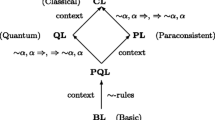Summary
The general fact of the impossibility of a bivalent, truth-functional semantics for the propositional structures determined by quantum mechanics should be more subtly demarcated according to whether the structures are taken to be orthomodular latticesP
L or partial-Boolean algebrasP
A; according to whether the semantic mappings are required to be truth-functional or truth-functional
or truth-functional ; and according to whether two-or-higher dimensional Hilbert spaceP structures or three-or-higher dimensional Hilbert spaceP structures are being considered.
; and according to whether two-or-higher dimensional Hilbert spaceP structures or three-or-higher dimensional Hilbert spaceP structures are being considered.
If the quantumP structures are taken to be orthomodular latticesP
L, then bivalent mappings which preserve the operations and relations of aP
L must be truth-functional . Then as suggested by von Neumann and Jauch-Piron and as proven in this paper, the mere presence of incompatible elements in aP
L is sufficient to rule out any semantical or hidden-variable proposal which imposes this strong condition, for anytwo-or-higher dimensional Hilbert spaceP
L structure. Thus from the orthomodular lattice perspective, the peculiarly non-classical feature of quantum mechanics and the peculiarly non-Boolean feature of the quantum propositional structures is the existence of incompatible magnitudes and propositions.
. Then as suggested by von Neumann and Jauch-Piron and as proven in this paper, the mere presence of incompatible elements in aP
L is sufficient to rule out any semantical or hidden-variable proposal which imposes this strong condition, for anytwo-or-higher dimensional Hilbert spaceP
L structure. Thus from the orthomodular lattice perspective, the peculiarly non-classical feature of quantum mechanics and the peculiarly non-Boolean feature of the quantum propositional structures is the existence of incompatible magnitudes and propositions.
However, the weaker truth-functionality condition can instead be imposed upon the semantic or hidden-variable mappings on theP
L structures, although such mappings ignore the lattice meets and joins of incompatibles and preserve only the partial-Boolean algebra structural features of theP
L structures. Or alternatively, the quantum propositional structures can be taken to be partial-Boolean algebrasP
A, where bivalent mappings which preserve the operations and relations of aP
A need only be truth-functional (c). In either case, the Gleason, Kochen-Specker proofs show that any semantical or hidden variable proposal which imposes this truth-functionality (c) condition is impossible for anythree-or-higher dimensional Hilbert spaceP
A orP
L structures. But such semantical or hidden-variable proposals are possible for any two dimensional Hilbert spaceP
A orP
L structures, in spite of the presence of incompatibles in these structures, in spite of the fact that Heisenberg's Uncertainty Principle applies to the incompatible elements in these structures, and in spite of the fact that these structures are non-Boolean in the Piron sense.
condition can instead be imposed upon the semantic or hidden-variable mappings on theP
L structures, although such mappings ignore the lattice meets and joins of incompatibles and preserve only the partial-Boolean algebra structural features of theP
L structures. Or alternatively, the quantum propositional structures can be taken to be partial-Boolean algebrasP
A, where bivalent mappings which preserve the operations and relations of aP
A need only be truth-functional (c). In either case, the Gleason, Kochen-Specker proofs show that any semantical or hidden variable proposal which imposes this truth-functionality (c) condition is impossible for anythree-or-higher dimensional Hilbert spaceP
A orP
L structures. But such semantical or hidden-variable proposals are possible for any two dimensional Hilbert spaceP
A orP
L structures, in spite of the presence of incompatibles in these structures, in spite of the fact that Heisenberg's Uncertainty Principle applies to the incompatible elements in these structures, and in spite of the fact that these structures are non-Boolean in the Piron sense.
Similar content being viewed by others
Author information
Authors and Affiliations
Additional information
The present paper is a sequel of the proceedings of theSociety of Exact Philosophy annual meeting, published in our issue 9:2, pp. 187–278. — Ed.
I am indebted to my supervisor, Dr. Edwin Levy, for many hours of helpful discussion on the drafts leading to this paper.
Rights and permissions
About this article
Cite this article
Chernavska, A. The impossibility of a bivalent truth-functional semantics for the non-Boolean propositional structures of quantum mechanics. Philosophia 10, 1–18 (1981). https://doi.org/10.1007/BF02380489
Issue Date:
DOI: https://doi.org/10.1007/BF02380489




